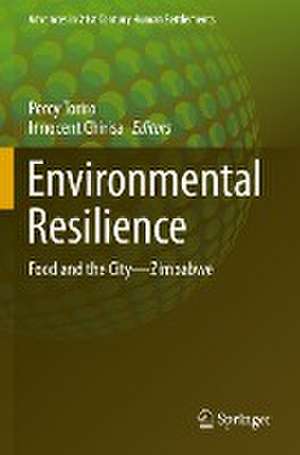Environmental Resilience: Food and the City—Zimbabwe: Advances in 21st Century Human Settlements
Editat de Percy Toriro, Innocent Chirisaen Limba Engleză Paperback – 23 mai 2022
| Toate formatele și edițiile | Preț | Express |
|---|---|---|
| Paperback (1) | 482.94 lei 6-8 săpt. | |
| Springer Nature Singapore – 23 mai 2022 | 482.94 lei 6-8 săpt. | |
| Hardback (1) | 698.94 lei 6-8 săpt. | |
| Springer Nature Singapore – 22 mai 2021 | 698.94 lei 6-8 săpt. |
Din seria Advances in 21st Century Human Settlements
- 23%
 Preț: 1043.58 lei
Preț: 1043.58 lei - 15%
 Preț: 701.40 lei
Preț: 701.40 lei - 18%
 Preț: 1446.43 lei
Preț: 1446.43 lei -
 Preț: 132.70 lei
Preț: 132.70 lei - 18%
 Preț: 787.15 lei
Preț: 787.15 lei - 18%
 Preț: 725.75 lei
Preț: 725.75 lei - 18%
 Preț: 896.63 lei
Preț: 896.63 lei - 15%
 Preț: 632.19 lei
Preț: 632.19 lei - 15%
 Preț: 589.33 lei
Preț: 589.33 lei - 15%
 Preț: 640.71 lei
Preț: 640.71 lei - 18%
 Preț: 958.73 lei
Preț: 958.73 lei -
 Preț: 398.74 lei
Preț: 398.74 lei - 18%
 Preț: 902.55 lei
Preț: 902.55 lei - 18%
 Preț: 797.73 lei
Preț: 797.73 lei - 15%
 Preț: 584.92 lei
Preț: 584.92 lei - 15%
 Preț: 586.30 lei
Preț: 586.30 lei - 15%
 Preț: 652.31 lei
Preț: 652.31 lei - 18%
 Preț: 1113.09 lei
Preț: 1113.09 lei - 20%
 Preț: 1053.98 lei
Preț: 1053.98 lei - 18%
 Preț: 733.96 lei
Preț: 733.96 lei - 18%
 Preț: 1127.28 lei
Preț: 1127.28 lei - 18%
 Preț: 1235.43 lei
Preț: 1235.43 lei - 15%
 Preț: 581.44 lei
Preț: 581.44 lei - 15%
 Preț: 582.63 lei
Preț: 582.63 lei - 15%
 Preț: 695.53 lei
Preț: 695.53 lei - 18%
 Preț: 1231.01 lei
Preț: 1231.01 lei - 23%
 Preț: 1119.80 lei
Preț: 1119.80 lei - 18%
 Preț: 730.02 lei
Preț: 730.02 lei - 15%
 Preț: 643.84 lei
Preț: 643.84 lei - 18%
 Preț: 728.91 lei
Preț: 728.91 lei - 18%
 Preț: 965.97 lei
Preț: 965.97 lei - 18%
 Preț: 958.25 lei
Preț: 958.25 lei - 18%
 Preț: 1861.71 lei
Preț: 1861.71 lei - 18%
 Preț: 1116.26 lei
Preț: 1116.26 lei - 18%
 Preț: 781.45 lei
Preț: 781.45 lei - 18%
 Preț: 900.49 lei
Preț: 900.49 lei
Preț: 482.94 lei
Nou
Puncte Express: 724
Preț estimativ în valută:
92.41€ • 96.48$ • 76.48£
92.41€ • 96.48$ • 76.48£
Carte tipărită la comandă
Livrare economică 04-18 aprilie
Preluare comenzi: 021 569.72.76
Specificații
ISBN-13: 9789811603075
ISBN-10: 9811603073
Pagini: 202
Ilustrații: X, 202 p. 17 illus., 10 illus. in color.
Dimensiuni: 155 x 235 mm
Greutate: 0.3 kg
Ediția:1st ed. 2021
Editura: Springer Nature Singapore
Colecția Springer
Seria Advances in 21st Century Human Settlements
Locul publicării:Singapore, Singapore
ISBN-10: 9811603073
Pagini: 202
Ilustrații: X, 202 p. 17 illus., 10 illus. in color.
Dimensiuni: 155 x 235 mm
Greutate: 0.3 kg
Ediția:1st ed. 2021
Editura: Springer Nature Singapore
Colecția Springer
Seria Advances in 21st Century Human Settlements
Locul publicării:Singapore, Singapore
Cuprins
Environmental resilience – Food and the city.-City food in Zimbabwe: The origins and evolution.- Urban food: An examination of the policy and legislative framework.-Food processing, handling and marketing in Zimbabwe.- Urban food markets and the resilience factor in Zimbabwe.- Food wastein urban Zimbabwe: Options for food recycling.- Food availability, preferences and consumption in Zimbabwean urban spaces.- Food and city planning management in Zimbabwe.- Zimbabwean urban planners and their role in urban food.- Training institutions and food in the curriculum.- The teaching of home economics in primary schools in Zimbabwe.- Informal food spaces: Implications for public health.- The future of food, the city and environment: Case for resilience in Zimbabwe.
Notă biografică
Percy Toriro is an Urban Planner practicing in Eastern and Southern Africa. He is also a Research Consultant with the African Centre for Cities at the University of Cape Town. He is a four-term past President of the Zimbabwe Institute of Regional and Urban Planners. He also taught in the Planning School at the University of Zimbabwe and once headed Town Planning for the City of Harare. Percy holds a PhD from the University of Cape Town and is a Fellow of the Balsillie School of International Affairs in Canada. His research areas include Housing, Urban Informality, Food Systems and Security, Migration, Urban Environments and Sustainability.
Textul de pe ultima copertă
This book discusses the production, distribution, regulatory and management frameworks that affect food in urban settings. It plugs a gap in knowledge especially in the sub-Saharan Africa region where food, despite its critical importance, has been ignored as a ‘determinant of success’ in the planning and management of cities and towns. The various chapters in the book demonstrate how urban populations in Zimbabwe and elsewhere have often devised ways to produce own food to supplement on their incomes. Food is produced largely by way of urban agriculture or imported from the countryside and sold in both formal and informal stores and stalls. The book shows how in spite of the important space food occupies in the lives of all city residents, the planning and regulatory framework does not facilitate the better performance of food systems.
Caracteristici
Addresses the growing challenge of urban food security in a global South context Appeals to a transdisciplinary audience including Planners, Geographers, Policy makers, Sociologists and City Managers Contextualizes for in the framework of urban planning and governance, while registering food security as a key factor in urban development and management
